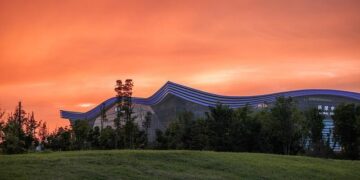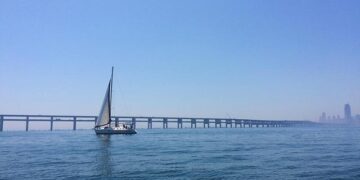Bangladesh Advances Energy Infrastructure with New Chinese-Engineered Oil Import Facility at Chattogram Port
Revolutionizing Oil Imports: The Introduction of the Single Point Mooring System
Bangladesh has taken a major leap forward in strengthening its energy import infrastructure by inaugurating its first oil delivery via a cutting-edge Single Point Mooring (SPM) system, constructed by Chinese engineers, at the crucial maritime hub of Chattogram port. This achievement, realized within the framework of China’s Belt and Road Initiative (BRI), represents a transformative step toward optimizing crude oil handling and enhancing supply chain fluidity for the nation.
The SPM installation is engineered to accommodate very large crude carriers (VLCCs), enabling direct transfer of petroleum products offshore without relying heavily on traditional dockside facilities. This innovation not only accelerates unloading times but also elevates operational safety standards—critical factors as Bangladesh confronts escalating energy consumption driven by rapid industrialization and urban growth.
Technical Highlights and Operational Advantages of the SPM Facility
The newly commissioned SPM system at Chattogram port introduces several operational improvements that are set to redefine Bangladesh’s oil import logistics:
- Accelerated Transfer Rates: The facility supports swift loading and offloading processes, significantly reducing tanker turnaround time compared to conventional methods.
- Cost Reduction: By minimizing dependency on extensive port infrastructure maintenance, operational expenses are curtailed.
- Enhanced Environmental Safeguards: Advanced monitoring technologies embedded in the system mitigate risks related to spills or accidents during transfer operations.
- Robust Supply Chain Reliability: Ensures consistent crude oil deliveries that underpin national energy security objectives.
| Specification | Description |
|---|---|
| Tanker Capacity Supported | Tankers up to 300,000 Deadweight Tonnage (DWT) |
| Mooring Mechanism Type | Sophisticated Single Point Mooring for secure vessel anchorage offshore |
| Siting Details | Cognizant placement along Chattogram’s coastal waters for strategic access |
The Broader Impact: Strategic Benefits for Bangladesh’s Energy Landscape
Bangladesh’s deployment of this advanced mooring technology signals more than just an infrastructural upgrade; it embodies a strategic pivot towards greater energy autonomy. By facilitating seamless direct transfers from supertankers into land-based storage systems, this setup alleviates chronic congestion issues historically experienced at busy docks. Consequently, it streamlines fuel logistics while reinforcing regulatory oversight over imports.
Key strategic outcomes include:
- Energized National Security: Faster import cycles reduce exposure to global supply shocks amid volatile markets.
- Economic Efficiency Gains: Lowered logistical overheads can translate into more competitive fuel pricing domestically.
- Catalyst for Infrastructure Growth: Modernized port capabilities attract further capital inflows supporting future energy ventures including LNG terminals or renewable integration projects.
Furthermore, this project exemplifies Bangladesh’s deepening collaboration within China’s expansive Belt and Road Initiative network—a partnership poised to unlock additional foreign direct investment opportunities across multiple sectors beyond hydrocarbons. As part of regional geopolitics reshaping South Asia’s economic corridors, enhanced infrastructure like this bolsters Bangladesh’s influence as an emerging trade nexus.
Additional implications encompass:
– Strengthened diplomatic ties fostering bilateral cooperation.
– Elevated attractiveness for multinational corporations seeking stable supply chains.
– Potential platform development toward diversified clean energy adoption aligned with global sustainability goals.
Navigating Future Prospects: Strategic Recommendations for Sustainable Development under BRI Frameworks
Aiming to fully capitalize on these infrastructural advancements linked with BRI initiatives requires adopting comprehensive strategies emphasizing environmental stewardship, community participation, and technological modernization. Engaging local stakeholders throughout planning phases ensures alignment with socio-economic priorities while fostering ownership that enhances project longevity.
Sustainability-focused construction practices—such as utilizing low-impact materials—and integrating smart digital solutions like AI-driven logistics management can optimize resource use while curbing ecological footprints. Equally important is investing in workforce capacity building through targeted training programs designed to equip local talent with skills necessary for operating sophisticated systems efficiently.
These approaches collectively support resilient economic growth balanced against environmental preservation imperatives.
| Strategic Focus Area | Description |
|---|---|
| Sustainable Development Practices | Employ eco-conscious materials & minimize habitat disruption during construction. |
This multi-pronged approach will ensure that infrastructure projects not only meet immediate logistical needs but also contribute positively towards long-term sustainable development goals aligned with both national interests and international commitments such as the UN SDGs (Sustainable Development Goals).
A Forward-Looking Perspective on Bangladesh’s Maritime Energy Infrastructure Evolution
The commissioning of the Chinese-engineered Single Point Mooring system at Chattogram stands out as a landmark achievement propelling Bangladesh closer toward modernizing its maritime oil handling capabilities amidst rising domestic demand pressures. Embedded within China’s Belt and Road vision yet tailored carefully around national priorities, this initiative exemplifies how international partnerships can drive tangible progress in critical sectors like energy logistics.
This advancement promises lasting benefits — from smoother supply chains reducing costs downstream—to positioning Bangladesh strategically within South Asia’s evolving trade ecosystem. As similar projects unfold across ports nationwide leveraging innovative technologies coupled with sustainable practices, the country is well-poised not only to meet current challenges but also embrace future opportunities spanning cleaner fuels integration through LNG terminals or renewables expansion.
The trajectory set forth by such developments heralds an era where enhanced connectivity fosters inclusive economic growth regionally while safeguarding environmental integrity — ultimately shaping a resilient foundation upon which Bangladesh can build its prosperous tomorrow.














